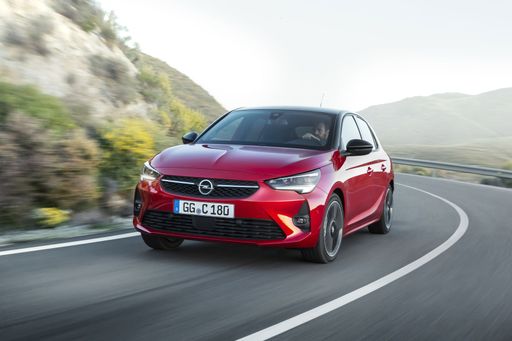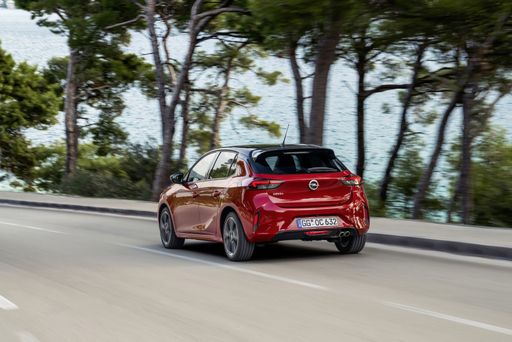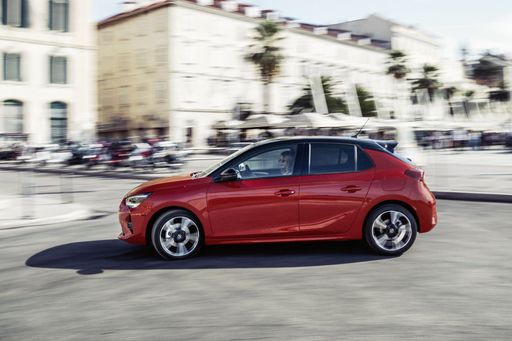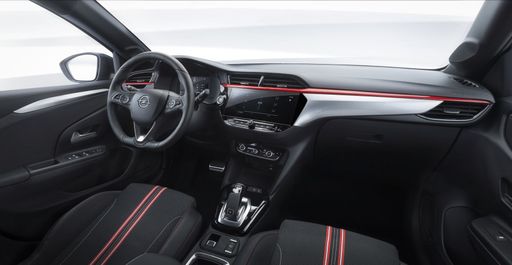Opel Corsa VS Renault Express – Specs, Efficiency & Price Comparison
Which model is the better choice – the Opel Corsa or the Renault Express? We compare performance (156 HP vs 102 HP), boot capacity (309 L vs ), efficiency (14.20 kWh4.50 L vs 4.60 L), and of course, the price (19400 £ vs 17100 £).
Find out now which car fits your needs better!
The Opel Corsa ({ body-type_1}) is powered by a Petrol, Petrol MHEV, Electric engine and comes with a Manuel, Automatic transmission. In comparison, the Renault Express (Cargo Van) features a Diesel, Petrol engine and a Manuel gearbox.
When it comes to boot capacity, the Opel Corsa offers 309 L, while the Renault Express provides – depending on what matters most to you. If you’re looking for more power, you’ll need to decide whether the 156 HP of the Opel Corsa or the 102 HP of the Renault Express suits your needs better.
There are also differences in efficiency: 14.20 kWh4.50 L vs 4.60 L. In terms of price, the Opel Corsa starts at 19400 £, while the Renault Express is available from 17100 £.
Compare all the key specs now and find out which model fits your lifestyle best!
Opel Corsa
The Opel Corsa continues to be a strong contender in the compact car market, offering a blend of stylish design and practicality. Its interior is thoughtfully laid out, providing drivers with a comfortable and engaging experience, while the technology on offer ensures connectivity and ease of use. With its efficient performance and reputation for reliability, the Corsa remains a popular choice for urban and suburban motoring needs.
details @ media.stellantis.com
@ media.stellantis.com
 @ media.stellantis.com
@ media.stellantis.com
 @ media.stellantis.com
@ media.stellantis.com
 @ media.stellantis.com
@ media.stellantis.com
Renault Express
The Renault Express brings a fresh design to the van segment, combining practicality with modern styling cues. Its spacious interior and clever storage solutions make it an ideal choice for both business and leisure purposes. With a focus on comfort and functionality, this vehicle stands out as a versatile option for those in need of reliable transportation.
details

|
|
|
|
|
Costs and Consumption |
|
|---|---|
|
Price
19400 - 32600 £
|
Price
17100 - 19500 £
|
|
Consumption L/100km
4.5 - 5.7 L
|
Consumption L/100km
4.6 - 6.6 L
|
|
Consumption kWh/100km
14.2 - 15.7 kWh
|
Consumption kWh/100km
-
|
|
Electric Range
357 - 405 km
|
Electric Range
-
|
|
Battery Capacity
46 - 51 kWh
|
Battery Capacity
-
|
|
co2
0 - 127 g/km
|
co2
121 - 149 g/km
|
|
Fuel tank capacity
44 L
|
Fuel tank capacity
50 L
|
Dimensions and Body |
|
|---|---|
|
Body Type
Hatchback
|
Body Type
Cargo Van
|
|
Seats
5
|
Seats
2
|
|
Doors
5
|
Doors
4
|
|
Curb weight
1175 - 1544 kg
|
Curb weight
1296 - 1390 kg
|
|
Trunk capacity
267 - 309 L
|
Trunk capacity
-
|
|
Length
4061 mm
|
Length
4393 mm
|
|
Width
1765 mm
|
Width
1775 mm
|
|
Height
1435 mm
|
Height
1811 mm
|
|
Payload
376 - 445 kg
|
Payload
575 - 700 kg
|
Engine and Performance |
|
|---|---|
|
Engine Type
Petrol, Petrol MHEV, Electric
|
Engine Type
Diesel, Petrol
|
|
Transmission
Manuel, Automatic
|
Transmission
Manuel
|
|
Transmission Detail
Manual Gearbox, Automatic Gearbox, Dual-Clutch Automatic, Reduction Gearbox
|
Transmission Detail
Manual Gearbox
|
|
Drive Type
Front-Wheel Drive
|
Drive Type
Front-Wheel Drive
|
|
Power HP
100 - 156 HP
|
Power HP
75 - 102 HP
|
|
Acceleration 0-100km/h
7.9 - 10.8 s
|
Acceleration 0-100km/h
11.9 - 16.3 s
|
|
Max Speed
150 - 210 km/h
|
Max Speed
100 - 167 km/h
|
|
Torque
205 - 260 Nm
|
Torque
200 - 240 Nm
|
|
Number of Cylinders
3
|
Number of Cylinders
4
|
|
Power kW
74 - 115 kW
|
Power kW
55 - 75 kW
|
|
Engine capacity
1199 cm3
|
Engine capacity
1332 - 1461 cm3
|
General |
|
|---|---|
|
Model Year
2023 - 2024
|
Model Year
2021
|
|
CO2 Efficiency Class
D, C, A
|
CO2 Efficiency Class
D, E
|
|
Brand
Opel
|
Brand
Renault
|
Opel Corsa
The Opel Corsa: A Compact Yet Mighty Hatchback
The Opel Corsa has been a staple in the automotive market for years, offering a practical and efficient solution for those seeking a compact vehicle. With the latest models, Opel continues to push the boundaries of innovation, while maintaining the Corsa's legacy of reliability and affordability.
Under the Hood: Diverse Engine Options
The Opel Corsa comes equipped with a variety of engine options to cater to diverse driving needs. From traditional petrol engines to the more environmentally conscious hybrid and fully electric variants, drivers can choose according to their preferences and requirements. The petrol engines are powered by a robust 1.2-litre engine, offering horsepower ranging from 75 to 130 PS, combined with a commendable fuel efficiency of 4.6 to 5.7 L/100km.
For those prioritising eco-friendliness and lower running costs, the electric version of the Corsa boasts a 50 kWh battery, capable of delivering a range between 354 to 405 km on a single charge, depending on the model chosen. The electric version impresses with a consumption of just 14.6 to 15.8 kWh/100km, offering a smooth and quiet ride while reducing your carbon footprint.
High Performance Meets Efficiency
No matter the engine choice, performance is a given with the Corsa range. The acceleration from 0-100 km/h varies from 7.9 to 13.2 seconds, providing the driver with a responsive and agile driving experience. With a maximum speed stretching from 150 to 210 km/h and torque values between 118 to 260 Nm, you can navigate through city streets and highways with ease and confidence.
Impressive Technical Innovations
The Opel Corsa is not just about performance. It also incorporates a slew of technical innovations designed to enhance the driving experience. From sophisticated infotainment systems that keep you connected to advanced safety features that ensure peace of mind. These systems offer seamless connectivity options and provide real-time vehicle updates to keep you informed about your car's health.
Efficiency and Practicality Combined
The Opel Corsa manages to blend efficiency with practicality seamlessly. With spacious seating for five passengers and a boot space ranging from 267 to 309 litres, it's well-suited for both daily commutes and longer road trips. The car's compact dimensions, with a length of 4061 mm, width of 1765 mm, and height of 1435 mm, facilitate easy parking and manoeuvring in urban environments, without compromising on passenger comfort.
Conclusion: The Perfect Urban Companion
In conclusion, the Opel Corsa remains a leading choice for those seeking a compact hatchback that combines style, performance, and innovation. Its varied engine options cater to both the eco-conscious and those seeking a bit more power, while its technological advancements keep it at the forefront of modern automotive design. Whatever your preference, the Opel Corsa promises a driving experience that is both satisfying and efficient.
Renault Express
Introduction to the Renault Express
The Renault Express, a compact van from the renowned French manufacturer, continues to make a lasting impression in the versatile light commercial vehicle segment. With its practical design and array of engine configurations, it caters to a wide spectrum of business needs, offering both diesel and petrol variants. As we delve into the details, we'll explore the specifications and innovations that set the Renault Express apart from its competitors.
Efficient Powertrains
The Renault Express boasts a diverse range of engines tailored for efficiency and performance. At the core, it features a selection of both diesel and petrol engines, with outputs ranging from 75 PS to 102 PS. This ensures that operators can select a powertrain that precisely matches their performance requirements and budget constraints.
Whether you opt for the BLUE dCi diesel engine or the TCe petrol variant, the Renault Express promises robust performance combined with impressive fuel economy ranging from 4.6 to 6.6 L/100km. The manual transmission and front-wheel drive configuration further contribute to its efficient operation.
Practicality and Usability
Designed with practicality in mind, the Renault Express excels in usability. With a load capacity ranging from 575 to 700 kg, it provides adequate cargo space for business users. Its compact dimensions—measuring 4,393 mm in length, 1,775 mm in width, and 1,811 mm in height—ensure it remains manoeuvrable even in tight urban environments.
The van’s 50 L fuel tank complements its fuel-efficient nature, minimizing the frequency of refuelling stops and enhancing productivity.
Comfortable and Functional Interior
Inside the Renault Express, a no-nonsense cabin offers comfort and functionality across its two-seat configuration. The straightforward yet ergonomic layout is designed for those who spend significant time on the road. Essential features are included to support the driver, ensuring a pleasant experience even during long journeys.
Safety and Innovation
Renault has not compromised on safety with the Express. With modern safety protocols, the van aims to offer peace of mind to its occupants. Although it's built primarily for utility, the inclusion of essential safety features demonstrates Renault’s commitment to protecting its drivers and cargo.
Innovation is further represented through its environmental considerations, such as the CO2 efficiency class spanning D to E, and emissions ranging from 121 to 149 g/km. This conscientious engineering underscores Renault’s efforts towards a more sustainable future.
Final Thoughts
In conclusion, the Renault Express is a testament to Renault's expertise in crafting efficient, reliable light commercial vehicles. Its blend of power, economy, and practicality makes it a competitive choice for businesses seeking a dependable partner on the road. With a starting price point that remains accessible, the Renault Express continues to deliver exceptional value to its customers, making it a standout in the small van category.
The prices and data displayed are estimates based on German list prices and may vary by country. This information is not legally binding.
